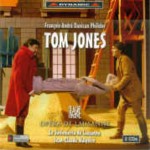Yes, this is based on Henry Fielding’s novel of the same name, just 15 years old when Philidor began composing his opera to a libretto written especially for him. It was revised both textually and musically the following year (1766) and was quite a hit. The comedy is bright and avoids some of the novel’s more picaresque episodes; it concentrates on the love between Sophie and Tom–she of high birth and he, so it is thought until the end, of low birth. Being a fan of both the novel and Philidor, I looked forward to hearing this opera (or operetta), but I came away from this recording less interested than when I arrived.
For starters, fully a third of the work is dialogue, and while this might work live in the theater or in a recording with both more presence and actor/singers better able to bring the words and mood across, it’s hard to sit through. In addition, the singing is mediocre. Much of this music is not difficult, but it requires attractive voices with charm, and we don’t get it here. Both tenor and soprano (Tom and Sophie) have tentative techniques and unappealing sounds, and since they are the opera’s pivots, what’s left? Marc Barrard’s buffo-ish Mr. Western is quite good, and Rodolphe Briand does what he can with the insufferable Blifil. The good news–though not good enough–is the spirited playing of the Lausanne forces under Jean-Claude Malgoire and the freshness of the score. So this isn’t exactly a dud, and it’s of historical interest.
































